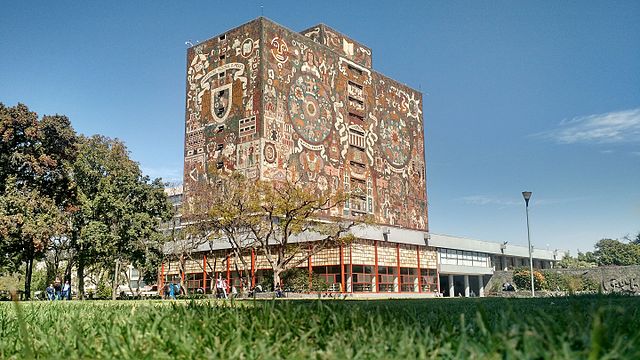×
QuicknavManagement Center Innsbruck
- Mein Studium
- Services
- Student Life
- Student Life
- International
UNAM Universidad Nacional Autónoma de México

Year of foundation: 1910
Approx. number of students: 324,000
Period of study: Early August-Early December; End January-Early June
MCI partner since: 2016
Mexico City is the Federal District (Distrito Federal), capital of Mexico and seat of the federal powers of the Mexican Union. It is a federal entity within Mexico which is not part of any one of the 31 Mexican states but belongs to the federation as a whole. Mexico City is the country's largest city as well as its most important political, cultural, educational and financial center.
It is located in the Valley of Mexico (Valle de México), a large valley in the high plateaus at the center of Mexico, at an altitude of 2,240 metres. The 2009 estimated population for the city proper was around 8.84 million people.
The city was originally built on an island of Lake Texcoco by the Aztecs in 1325 as Tenochtitlan, which was almost completely destroyed in the 1521 siege of Tenochtitlan, and subsequently redesigned and rebuilt in accordance with the Spanish urban standards
Besides being one of the most recognized universities in Latin America and the Spanish-speaking world in general, its campus is one of the largest and most artistically detailed. It is a UNESCO World Heritage site that was designed by some of Mexico's best-known architects of the 20th century. Murals in the main campus were painted by some of the most recognized artists in Mexican history such as Diego Rivera and David Alfaro Siqueiros.
https://www.unam.mx/
Zurück
Approx. number of students: 324,000
Period of study: Early August-Early December; End January-Early June
MCI partner since: 2016
The City
Mexico City is the Federal District (Distrito Federal), capital of Mexico and seat of the federal powers of the Mexican Union. It is a federal entity within Mexico which is not part of any one of the 31 Mexican states but belongs to the federation as a whole. Mexico City is the country's largest city as well as its most important political, cultural, educational and financial center.
It is located in the Valley of Mexico (Valle de México), a large valley in the high plateaus at the center of Mexico, at an altitude of 2,240 metres. The 2009 estimated population for the city proper was around 8.84 million people.
The city was originally built on an island of Lake Texcoco by the Aztecs in 1325 as Tenochtitlan, which was almost completely destroyed in the 1521 siege of Tenochtitlan, and subsequently redesigned and rebuilt in accordance with the Spanish urban standards
The University
The National Autonomous University of Mexico (Spanish: Universidad Nacional Autónoma de México, UNAM) is the largest university in Latin America. As a public research university in Mexico City, the UNAM is widely regarded by many university world rankings as the leading university of the Spanish-speaking world.Besides being one of the most recognized universities in Latin America and the Spanish-speaking world in general, its campus is one of the largest and most artistically detailed. It is a UNESCO World Heritage site that was designed by some of Mexico's best-known architects of the 20th century. Murals in the main campus were painted by some of the most recognized artists in Mexican history such as Diego Rivera and David Alfaro Siqueiros.
https://www.unam.mx/
Zurück
Wir nutzen Cookies auf unserer Website. Einige von ihnen sind essenziell für den Betrieb der Seite, während andere uns helfen, diese Website und die Nutzererfahrung zu verbessern (Tracking Cookies). Sie können selbst entscheiden, ob Sie die Cookies zulassen möchten. Bitte beachten Sie, dass bei einer Ablehnung womöglich nicht mehr alle Funktionalitäten der Seite zur Verfügung stehen.

